
The whistle blows, the crowd roars, and 22 armored athletes crash into each other with such force that players have broken bones, been knocked unconscious, paralyzed or even killed during gameplay. This is football, American style, but China is going to have to wait a little longer to see it in action.
The U.S. National Football League (NFL) in early April said it would shelve a planned exhibition game between two top American teams scheduled for Beijing this summer. The game, called the "China Bowl," is now scheduled for 2009. The problem, say organizers, is that American-style football is still relatively unknown in China and preparing the market has proven to be more difficult than first thought.
With 1.3 billion potential Chinese consumers, U.S. professional sports organizations are rushing to capitalize on the sports frenzy building in China around the 2008 Olympic Games. Basketball, which has produced Chinese stars like Yao Ming, and baseball, which has found a ready market in Asia, have been successful in their ventures. However, "American-style olive ball," as it is known in Mandarin, is a tougher challenge.
The China Bowl was also muscled out by a planned game in London scheduled for October, which will be the first regular season of NFL game to be played outside the United States.The game was announced after plans for China Bowl were released, but it will take precedence over the game in Beijing, NFL executives said.
Though the delay was a "disappointment," when evaluating the China Bowl the NFL wanted to ensure it had a large enough fan base in China that would be interested and knowledgeable about American football, said Mark Waller, Senior Vice President for NFL International. By delaying the game, the NFL hopes to build on the small steps it has already taken to market the sport.
"What you'll see in the next two years is a lot more emphasis on building and customizing some of our media content. At the moment, we have a broadcast arrangement with China Central Television (CCTV) and those games go out delayed but in their entirety. It's at pretty unsocial hours to be honest," Waller said.
The NFL may begin broadcasting highlights of recent American games, summary content or perhaps content that explains to the Chinese audience how the game is played, he said, all during more primetime hours. The NFL is also looking into partnerships with Chinese websites to publish game information online.
"It's important for us that we raise awareness and education of the game through the digital media capabilities that are now available," Waller said.
In its efforts to promote the sport in China, the NFL in 2003 launched a flag football program for students aged 8 to 14 in Beijing, Shanghai and Guangzhou. According to an NFL release, the program has reached 40,000 students at 80 schools so far and China was selected to host the sixth annual NFL Flag Football World Championship in 2005. Ten countries have NFL flag football programs. Beijing sports teacher Wang Jin told USA Today that many Chinese do not realize the sport is about brains as much as it is about brawn, and that the strategic nature of the game should appeal to the Chinese culture.
The flag football program over the past three years has been successful, Waller said, but the program is not used at its fullest potential yet.
"It probably needs to be A: expanded and B: deepened," Waller said, "so that we can do a better job of engaging those fans in our game and making sure that they truly are passionate and motivated about it. There will be more work that we can do locally and build some partnerships locally."
There are no current plans to expand the flag football program beyond the three core cities it reaches now, Waller said, but the NFL sees it as an important niche to carve out in the upcoming years. Compared to basketball, which he said was played by an estimated 300 million Chinese, the flag football program has a lot of room for growth.
"Success for us is that the people we connect with enjoy it, engage with it, and love it for what it is," Waller said. "I think it's very successful, but it's not scaled success. It's very focused, very targeted and it's important to those people who engage in it."
| 